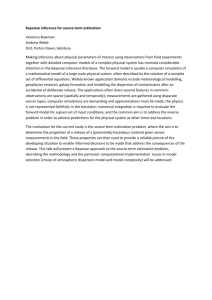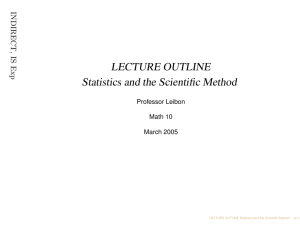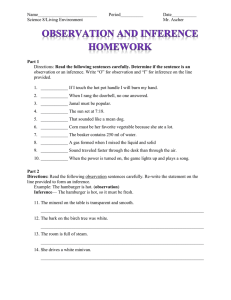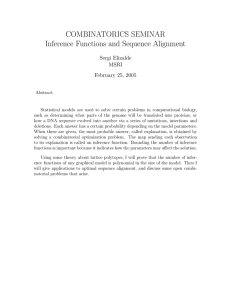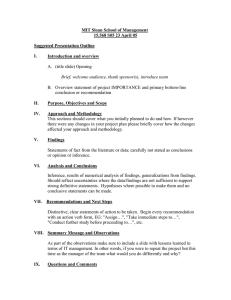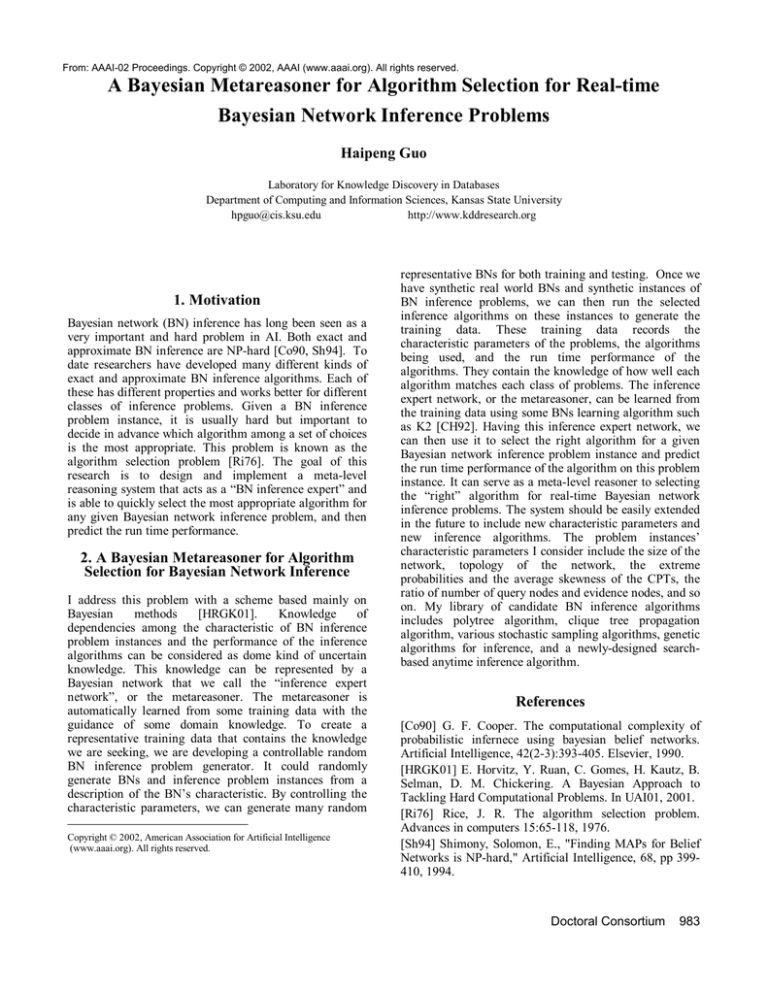
From: AAAI-02 Proceedings. Copyright © 2002, AAAI (www.aaai.org). All rights reserved.
A Bayesian Metareasoner for Algorithm Selection for Real-time
Bayesian Network Inference Problems
Haipeng Guo
Laboratory for Knowledge Discovery in Databases
Department of Computing and Information Sciences, Kansas State University
hpguo@cis.ksu.edu
http://www.kddresearch.org
1. Motivation
Bayesian network (BN) inference has long been seen as a
very important and hard problem in AI. Both exact and
approximate BN inference are NP-hard [Co90, Sh94]. To
date researchers have developed many different kinds of
exact and approximate BN inference algorithms. Each of
these has different properties and works better for different
classes of inference problems. Given a BN inference
problem instance, it is usually hard but important to
decide in advance which algorithm among a set of choices
is the most appropriate. This problem is known as the
algorithm selection problem [Ri76]. The goal of this
research is to design and implement a meta-level
reasoning system that acts as a “BN inference expert” and
is able to quickly select the most appropriate algorithm for
any given Bayesian network inference problem, and then
predict the run time performance.
2. A Bayesian Metareasoner for Algorithm
Selection for Bayesian Network Inference
I address this problem with a scheme based mainly on
Bayesian
methods
[HRGK01].
Knowledge
of
dependencies among the characteristic of BN inference
problem instances and the performance of the inference
algorithms can be considered as dome kind of uncertain
knowledge. This knowledge can be represented by a
Bayesian network that we call the “inference expert
network”, or the metareasoner. The metareasoner is
automatically learned from some training data with the
guidance of some domain knowledge. To create a
representative training data that contains the knowledge
we are seeking, we are developing a controllable random
BN inference problem generator. It could randomly
generate BNs and inference problem instances from a
description of the BN’s characteristic. By controlling the
characteristic parameters, we can generate many random
Copyright © 2002, American Association for Artificial Intelligence
(www.aaai.org). All rights reserved.
representative BNs for both training and testing. Once we
have synthetic real world BNs and synthetic instances of
BN inference problems, we can then run the selected
inference algorithms on these instances to generate the
training data. These training data records the
characteristic parameters of the problems, the algorithms
being used, and the run time performance of the
algorithms. They contain the knowledge of how well each
algorithm matches each class of problems. The inference
expert network, or the metareasoner, can be learned from
the training data using some BNs learning algorithm such
as K2 [CH92]. Having this inference expert network, we
can then use it to select the right algorithm for a given
Bayesian network inference problem instance and predict
the run time performance of the algorithm on this problem
instance. It can serve as a meta-level reasoner to selecting
the “right” algorithm for real-time Bayesian network
inference problems. The system should be easily extended
in the future to include new characteristic parameters and
new inference algorithms. The problem instances’
characteristic parameters I consider include the size of the
network, topology of the network, the extreme
probabilities and the average skewness of the CPTs, the
ratio of number of query nodes and evidence nodes, and so
on. My library of candidate BN inference algorithms
includes polytree algorithm, clique tree propagation
algorithm, various stochastic sampling algorithms, genetic
algorithms for inference, and a newly-designed searchbased anytime inference algorithm.
References
[Co90] G. F. Cooper. The computational complexity of
probabilistic infernece using bayesian belief networks.
Artificial Intelligence, 42(2-3):393-405. Elsevier, 1990.
[HRGK01] E. Horvitz, Y. Ruan, C. Gomes, H. Kautz, B.
Selman, D. M. Chickering. A Bayesian Approach to
Tackling Hard Computational Problems. In UAI01, 2001.
[Ri76] Rice, J. R. The algorithm selection problem.
Advances in computers 15:65-118, 1976.
[Sh94] Shimony, Solomon, E., "Finding MAPs for Belief
Networks is NP-hard," Artificial Intelligence, 68, pp 399410, 1994.
Doctoral Consortium
983


